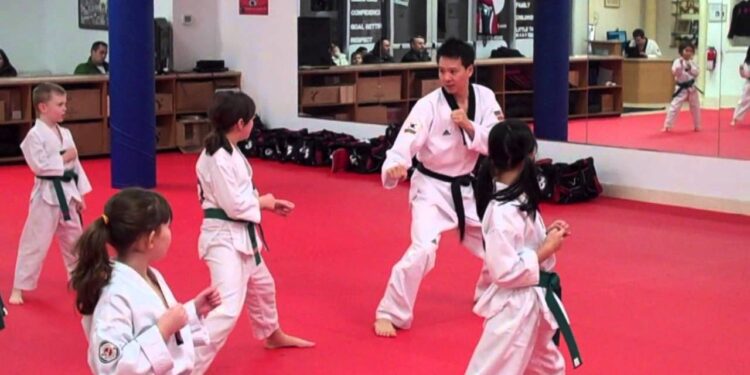Recognised Taekwondo

What is reorganization Taekwondo institutes in India?
Recognized Taekwondo Institutes, originating from Korea, has gained significant popularity worldwide as a martial art and a competitive sport. In India, the practice of Taekwondo has witnessed a surge in interest over the years, leading to the establishment of various reorganization institutes aimed at promoting and standardizing the art form across the country.
These reorganization institutes play a pivotal role in structuring the practice of Taekwondo in India by providing standardized training, certification, and organizational support to practitioners and instructors. One such prominent organization is the Taekwondo Federation of India (TFI), recognized by the World Taekwondo Federation (WTF) and the Indian Olympic Association (IOA).
TFI serves as the governing body for Taekwondo in India, responsible for regulating competitions, conducting training programs, and fostering the growth of the sport at all levels.
TFI collaborates with regional and state-level Taekwondo associations to ensure uniformity and adherence to international standards in training and competition. These State and District associations often function as extensions of TFI, working closely to promote grassroots development and talent identification in various regions of the country. They organize local tournaments, seminars, and Color Belt and Black Belt grading examinations, providing opportunities for practitioners to showcase their skills and progress through the ranks.
Apart from TFI, there are several other reorganization taekwondo institutes and academies scattered across India, each contributing to the dissemination and promotion of Taekwondo in its own capacity. These institutes often operate under the guidance of experienced masters and instructors who have dedicated their lives to the practice and propagation of Taekwondo.
The reorganization Taekwondo institutes in India not only focus on the physical aspects of Taekwondo but also emphasize its philosophical and moral dimensions. Training sessions typically incorporate elements of discipline, respect, and self-control, instilling valuable life skills in practitioners beyond just combat techniques.
Furthermore, these recognized Taekwondo academies institutes and serve as platforms for cultural exchange and camaraderie, fostering friendships and mutual understanding among practitioners from diverse backgrounds. Through collaborative efforts and a shared passion for Taekwondo, these reorganization institutes continue to play a vital role in shaping the landscape of martial arts in India, paving the way for future generations of practitioners to excel on both national and international stages.
How could we approach a recognized Taekwondo Academy?
Approaching a recognized Taekwondo Academy or Institute can be an exciting and rewarding endeavor for individuals seeking to delve into the world of martial arts. Whether you’re a complete novice or an experienced practitioner looking to refine your skills, the process of finding and engaging with a reputable academy involves several key steps.
First and foremost, research is paramount. Begin by identifying reputable Taekwondo academies in Delhi. This can be accomplished through online searches, word-of-mouth recommendations, or by consulting with local martial arts communities.
Look for academies affiliated with recognized governing bodies such as the Delhi Taekwondo Association, World Taekwondo Federation (WTF) or the International Taekwondo Federation (ITF), as this affiliation often indicates a commitment to quality instruction and adherence to standardized training practices.
Once you’ve compiled a list of potential academies, take the time to visit each one in person if possible. Observe a class or speak with instructors to get a sense of the Taekwondo academy’s teaching style, atmosphere, and overall professionalism. Pay attention to the cleanliness of the facilities, the demeanor of the instructors, and the level of engagement among students.
During your visit, don’t hesitate to ask questions. Inquire about the qualifications and experience of the coaches and instructors, the class schedule and curriculum, and any fees or membership requirements. A reputable Taekwondo academy will be transparent and forthcoming with this information, helping you make an informed decision about whether it’s the right fit for your goals and preferences.
Once you’ve found a Taekwondo academy that aligns with your needs and expectations, take the initiative to enroll in a beginner’s class or introductory Taekwondo program. This will provide you with firsthand experience of the training environment and allow you to assess whether it meets your needs before committing to a long-term membership.
Finally, approach your training with dedication, discipline, and an open mind. Respect the traditions and etiquette of Taekwondo, and be prepared to invest time and effort into mastering its techniques and principles. With commitment and perseverance, you’ll not only progress in your martial arts journey but also become a valued member of the Taekwondo community.
Fees structure of a recognized Taekwondo Academy?
The fee structure of a recognized Taekwondo academy varies depending on several factors such as location, reputation, facilities, and level of instruction. Generally, these academies offer a range of membership options to cater to different preferences and commitment levels of students.
One common fee structure involves monthly membership dues. These dues typically cover access to classes and facilities for a set number of sessions per week. The cost may vary depending on whether the student opts for group classes or private lessons. Group classes are usually more affordable, while private lessons command a higher fee due to the personalized attention provided by the instructor.
Challengers Group -> Taekwondo Classes Fees structure for Monthly and per day basis
(Classified by Areas, and Places)
| District/ Area | Private Classes – Week days | Private Classes – Weekends days |
Monthly – Private Tries a week |
Monthly – Group – Tries a week | For an year |
| North Delhi | Rs.1500 | Rs.2000 | Rs.20,000 | Rs.4,000 | Ask |
| North West – Delhi | Rs.2000 | Rs.2500 | Rs.25000 | Rs.6000 | Ask |
| West Delhi | Rs.1500 | Rs.2000 | Rs.20,000 | Rs.4000 | Ask |
| Central Delhi | Rs.1500 | Rs.2000 | Rs.20,000 | Rs.4000 | Ask |
| New Delhi | Rs.2500 | Rs.3000 | Rs.30,000 | Rs.6000 | Ask |
| East Delhi -1 | Rs.1200 | Rs.1500 | Rs.12000 | Rs.3000 | Ask |
| East Delhi -2 | Rs.2500 | Rs.3000 | Rs.25000 | Rs.6000 | Ask |
| South Delhi | Rs.2500 | Rs.3000 | Rs.25000 | Rs.6000 | Ask |
| South East Delhi | Rs.2000 | Rs.2500 | Rs.25000 | Rs.5000 | Ask |
| South West Delhi | Rs.2000 | Rs.2500 | Rs.25000 | Rs.6000 | Ask |
| West Delhi- 2 | Rs. 1200 | Rs.1500 | Rs.12000 | Rs.3000 | Ask |
| Paschim Vhr./ Punjabi Bagh | Rs.2500 | Rs.3000 | Rs.25000 | Rs.6000 | Ask |
| Vikas Puri | Rs.2500 | Rs.3000 | Rs.25000 | Rs.6000 | Ask |
| Anand Parbat | Rs.1000 | Rs.1000 | Rs.9000 | Rs.2500 | Ask |
| Shastri Nagar | Rs.1100 | Rs.1200 | Rs.11000 | Rs.2800 | Ask |
| Inderlok | Rs. 1200 | Rs.1500 | Rs.12000 | Rs.3500 | Ask |
| Karol Bagh | Rs.1500 | Rs.2000 | Rs.20,000 | Rs.4000 | Ask |
| Patel Nagar- West | Rs.1500* | Rs.2000* | Rs.20,000* | Rs.4000 | Ask |
Patel Nagar – East – Rs. 2000 – Rs.3000 – Rs.25,000 – Rs.6000
The above Taekwondo classes fees are for freshers practitioners only. It will not be applicable for Black Belt practitioners or outside Taekwondo trainers.
It will be strictly mandatory for all candidates before joining Challengers Group.
1- Applicants must be declared their previous practice history (If any).
2- Applicants must be declared their past history of learning/ Teaching/ involvements infomation like name of the institute, name of the instructor, previous Ranks (Anything in Martial Arts), any disputes or political involvements with sports association or federations.
3- Any physical or medical issues
4- Any criminal or legal proceeding history (with specific details)
5- Any records about border crossing, legally, illegally, officially.
6- Why do you choose Martial Arts. Specify the reasons. (Candidature only depends on this/ these questions answers).
Please – The changes will effect accordingly from areas to areas, if anyone want to take Taekwondo practice in other area, the fees will be changed accordingly (As low or High).
In addition to monthly dues, there may be initiation fees for new student. These fees often cover administrative costs, uniforms, and other necessary equipment. Some Taekwondo academies offer discounts or waive initiation fees for students/ practitioners who sign up for long-term memberships or refer new students.
Another factor influencing the fee structure is the belt grading system. Students are required to undergo periodic belt tests to progress to higher ranks. There may be additional fees associated with belt testing, including examination fees and the cost of purchasing new belts and certificates upon successful completion of a test.
Some academies also offer specialized training programs such as competition preparation or self-defense courses, which may have separate fees associated with them. These programs often involve more intensive instruction and personalized coaching tailored to the specific goals of the student.
It’s important to note that while cost is a consideration, prospective students should prioritize the quality of instruction and the reputation of the academy when choosing where to train. A recognized Taekwondo academy with experienced instructors, a comprehensive curriculum, and a supportive training environment can offer invaluable benefits that justify the investment in fees.
Ultimately, the fee structure of a recognized Taekwondo academy reflects the value of the instruction, facilities, and opportunities for personal growth and development that it provides to its members.
For any assistance – contact us at +91-9953553391





